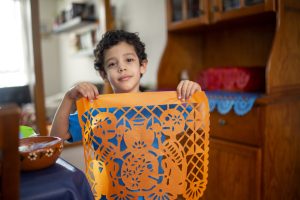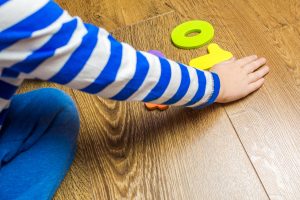Family conversations about math in everyday life can support early math development. Much of young children’s math knowledge grows through experiences around math with their caregivers. [1, 2] The more opportunities that children have for learning math and forming positive attitudes toward math, the better prepared children are for success in school and life. [3] There are opportunities for families to explore math almost everywhere—and in many activities that seem like they have little to do with math—such as when walking to school, putting away dishes, and even seeing the pediatrician.
Pediatricians Can Play a Role in Promoting Math
From waiting in the clinic to meeting with health care providers, math activities and ideas for math conversations can be incorporated into visits to the doctor. Health clinics offer unique opportunities to promote family math for key reasons, including:
- Access: Nearly 90 percent of U.S. families with children under 5 years old visit pediatricians for annual checkups. [4]
- Trust: Pediatricians are a trusted source of information, particularly around caregiving practices like building children’s skills at home.
- Time: Due to wait times, caregivers and children can spend considerable amounts of time together at the clinic before meeting with the pediatrician. [5]
Enriching clinics with playful early math activities offers families learning opportunities while they wait. The activities also provide doctors with conversation starters around math, letting them model and encourage math interest. Moreover, family-friendly math activities to do during wait times can ease the stress that many caregivers and children feel when visiting the doctor.
Researching Math Activities at Clinics
Our research team is studying how family math materials can be integrated into visits with pediatricians and how the materials affect children’s math development. We’re partnering with a community health center where a large proportion of residents are Spanish-speaking families. Our research focuses on pediatricians at health clinics, but every community organization with touchpoints to families with young children, such as libraries, museums, and parent education programs, can collaborate with caregivers and raise attention around early math learning.
We worked with the clinic’s pediatric team to develop simple, inexpensive early math materials that health care providers could give to families during well-child visits. The goal was to spark math exploration while children counted objects, labeled shapes, measured distances, and practiced other key early math skills. The materials were designed to be things that families could use together in the waiting and exam rooms, as well as after the appointment, at home.
Families received copies of the Spanish-English picture book, “Federico and the Wolf,” and the wordless book, “Hike.” Both books feature children of color. Bookmarks specific to each book offered tips for having math conversations while reading together. Families also received a set of tangram puzzles and a durable placemat with puzzle outlines (e.g., to make animal shapes out of the pieces) and math conversation tips. All materials included QR codes to a collection of math activities on the DREME Family Math website, many of which are available in Spanish.
Next Steps in the Partnership
Through our early testing of the materials, we have promising results from surveys and interviews with caregivers and pediatricians. Caregivers and children enjoyed the materials and used them at the clinic and at home, repeatedly.
Our preliminary findings suggest that, in addition to the math materials to take home, it might be valuable to design the health clinic space itself to offer families playful math learning opportunities. This year, we plan to work with the health clinic and MathTalk, a local organization with significant experience developing math installations, to increase ways for families to find and talk about math. This may include murals and hands-on materials.
Check back soon for updates about the redesign of the clinic and the results of our research. Until then, continue to explore the DREME Family Math website.
[1] Bustamante, A. S., Hassinger-Das, B., Hirsh-Pasek, K., & Golinkoff, R. M. (2019). Putting the science of learning to work: Designing learning landscapes for cities and families. Child Development Perspectives, 13(1), 34-40.
[2] Eason, S. H., Scalise, N. R., Berkowitz, T., Ramani, G. B., & Levine, S. C. (2022). Widening the lens of family math engagement: A conceptual framework and systematic review. Developmental Review, 66, 101046.
[3] G. J., Dowsett, C. J., Claessens, A., Magnuson, K., Huston, A. C., Klebanov, P., … Japel, C. (2007). School readiness and later achievement. Developmental Psychology, 43, 1428-1446.
[4] Child and Adolescent Health Measurement Initiative. 2020 National Survey of Children’s Health (NSCH) data query. Data Resource Center for Child and Adolescent Health supported by the U.S. Department of Health and Human Services, Health Resources and Services Administration (HRSA), Maternal and Child Health Bureau (MCHB). Retrieved Feb. 1, 2023 from https://www.childhealthdata.org/browse/survey/results?q=8948&r=1&g=898.
[5] Atchley, Megan Danielle DNP, FNP-C, CPN; Kroll, Nicole Peters PhD, APRN, ANP-C, FNP-BC; Etcher, LuAnn PhD, GNP-BC, CPG. Reducing the wait: When time is priceless. The Nurse Practitioner 46(2):p 50-55, February 2021. | DOI: 10.1097/01.NPR.0000731576.93905.48



